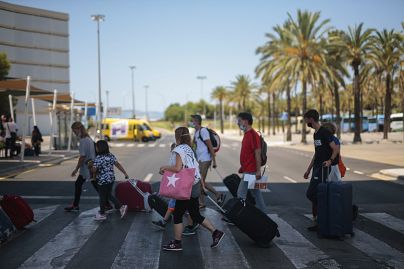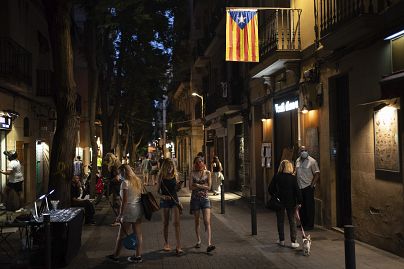Pedro Sanchez has condemned the British government's decision to impose a quarantine on all travellers returning from Spain.
Pedro Sanchez has condemned the British government's decision to impose a quarantine on all travellers returning from Spain.
The Spanish prime minister said in an interview with local broadcaster Telecinco that the ruling is "inappropriate" and doesn't fit with Spain's current epidemiological situation.
He argued that places heavily dependent on British tourists, like the Balearics and the Canary Islands, as well as Valencia and Andalusia, were safe destinations, as most of the new COVID-19 cases were recorded in the north-eastern regions of Catalonia and Aragon.
He added that his government is in talks with the British authorities "to try to convince them" to reconsider the measure.
The UK government on July 25 advised against all but essential travel to mainland Spain and told travellers returning from the country from July 26 to self-isolate for 14 days.
British authorities removed Spain from its list of safe countries, or so-called travel corridors, on midnight on Saturday, as Spain reported a spike in COVID-19 cases and as Catalonia shut nightlife venues in an attempt to prevent a second wave of the virus.
“We can’t make apologies...we must be able to take swift, decisive action,” British Foreign Secretary Dominic Raab told Sky News on Sunday.
In response, Europe's largest holiday company TUI said on Sunday it would cancel all flights to mainland Spain until August 9.
On Monday, the British government updated its advice against all non-essential travel to Spain to include the Balearic and Canary Islands. This came despite far lower infection rates in these areas than in other parts of Spain and appeals from the regional authorities for exemptions from the new UK rule.
"I think it's very important to stop the spread but it's really annoying that there has absolutely been no warning," said Helena, who was flying back to the UK from Madrid on Sunday in comments to the Associated Press.
"It's an absolute nightmare for everyone involved for the holidaymakers who are planning on coming out, the people who are here," said Georgie Frost, a British personal finance journalist who is currently in Spain's southeastern Murcia region visiting her partner.
She told Euronews she is "fortunate" that she is not forking out on accommodation and she has her work equipment with her as she thought the situation could arise.
She is due to come back to the UK on August 11 but does not know whether she will extend her stay if the quarantine rule stays in place.
"I would find it very difficult as a person working in personal finance to tell anyone to book a holiday abroad.
"The only condition I would say to think about [booking a holiday] is in a situation like mine and if you have family here who you can stay with," she said.
The tourism sector, which makes up for 12% of Spain's GDP, is already on its knees and is bound to be badly hit by the measure.
Some people on social media suggested they could circumvent the newly-reimposed quarantine rule by flying in from the British territory of Gibraltar, which is still on the government's safe places to fly to and from.
But a spokesperson for the Government of Gibraltar told Euronews: "It may be the case that some travellers choose to fly from Gibraltar rather than from, say, Malaga Airport but they are still required to submit a declaration stating whether or not they have been in Spain during the previous 14 days and will be subject to the same quarantine provisions when they get to the UK as if they had travelled from Spain."
'Our chance to be together as a family'
Tourists are not the only ones who are being affected by the change in the British government guidance.
Ian Rutter, a British citizen living in Andalusia, southern Spain, was set to fly back to the UK on Wednesday to join his grieving family after the death of his mother and brother in April.
He was not able to travel during that period due to lockdown restrictions.
"We couldn’t get back for the funerals and this was our chance to be together as a family to grieve," he told Euronews.
"I doubt if the hotels we have reserved will want us in such circumstances".
Rutter said that as the Foreign and Commonwealth Office travel helpline is only open from Monday to Friday he has "no idea" how to get advice on his situation.
Meanwhile, The UK’s transport secretary Grant Shapps, who is currently in Spain, will also have to self-isolate for 14 days upon his return.
Spain's situation is 'under control'
Spain recorded 280 new cases of COVID-19 in 24 hours on Friday, three times more than two weeks ago.
It comes less than a month after the country ended its lockdown.
The country is one of Europe's hardest hit by the pandemic, with more than 28,000 people killed by the virus and over 272,000 infections, according to data from the World Health Organization (WHO).
The Spanish government said on Sunday that the situation was "under control".
"The outbreaks are located, have been isolated and controlled," the foreign ministry told the AFP news agency.
The abrupt move by the UK comes as Norway said on Friday it would re-impose a 10-day quarantine requirement for people arriving from Spain from Saturday.
Meanwhile, French Prime Minister Jean Castex "strongly recommended" French citizens avoid going to Catalonia. The Franco-Catalan border nevertheless remains open.
The German Foreign Office followed suit on Monday advising against all non-essential travel, including "unnecessary tourist trips", to the Spanish regions of Catalonia, Aragon and Navarro due to the "high number of infections".
Although "the number of new (COVID-19) infections has dropped sharply," the German Foreign Office wrote on its website, "there are currently new regional clusters of infections in Aragon, Catalonia and Navarro".
Catalonia, Spain's northeastern region which is the country's tourism powerhouse, announced on Friday it would close late-night bars and nightclubs for 15 days.
Opening hours for bingo halls, gambling halls, and casinos have also been reduced as the region fears a second wave.
Catalonia, which is famed for its beaches and the city of Barcelona, reported 1,493 new coronavirus cases and three deaths on Saturday.
On July 17, the Catalan regional government urged some four million people – including all residents of Barcelona – to stay at home and avoid gatherings of more than 10 people.
But Frost said while people in Murcia wear masks in the 35-40 degree centigrade heat and despite restaurant and bar restrictions, "people do mingle".
She said the atmosphere in Spain was like a "blame game", with people pointing the finger at people coming to their second homes on the coast and spreading the virus, immigrants arriving by sea, and young people being careless.













